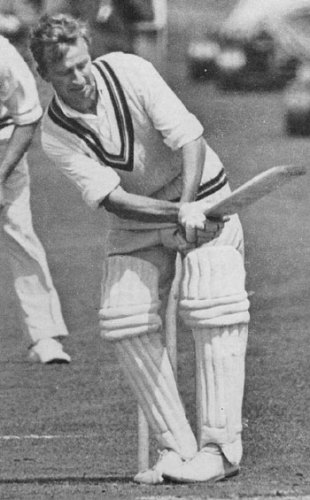Arthur Milton
ESPNcricinfo staff

| |||
Clement Arthur Milton died on April 25, 2007, aged 79. Arthur Milton was the 12th and last man to represent England at both cricket and soccer. There will never be another. And it seems unlikely there will be anyone else who quite so readily represents the schoolboy ideal of sporting excellence, in his looks, athleticism, grace and modesty. John Woodcock thought he was the most natural games player he had ever seen, surpassing even Denis Compton.
Milton was at Cotham Grammar School in Bristol, the same school as two other future Gloucestershire and England players, David Allen and John Mortimore, when Arsenal recruited him; he was in their reserve team before being called up in 1946. Over the next three years his sport was inevitably limited, though he was able to play his first two games for Gloucestershire in 1948, making an unbeaten 58 in the second match, against Combined Services, and adding 50 with another youngster, Tom Graveney, who reached his maiden century. Soon Milton was a regular run-getter, though it would be 1951 before he made a century himself.
By then he was Arsenal's first-choice right-winger, and that autumn - after only a dozen first division matches - his team-mate Jimmy Logie wandered over at a training session to tell him Tom Finney was injured and that he was playing for England against Austria at Wembley. Milton took his boots, caught the bus and went to the team hotel. It was a strange experience, he said later, playing in front of 98,000 people, in stiff new socks. He set up an early opportunity for Ivor Broadis to his left but saw little of the ball after that. He told the story to journalist Grahame Lloyd, for the book One Cap Wonders. It was his only soccer international, and soon he even lost his Arsenal place and was left out for the FA Cup final. Milton did play at least half the time over the next two seasons and occasionally encouraged hopes of an international recall, as in a 3-1 win over Spurs ("A light, lean chap with buttercup hair and looking like the 69,000 crowd's kid brother was the top attraction of the topping afternoon." - Daily Graphic). He won a League Championship medal in 1953, before being transferred to Bristol City in 1954-55, and winding down his football to concentrate on cricket. In 1952, he was Gloucestershire's leading batsman, and in 1953 his outstanding close catching was obvious enough for him to be used as a reserve fielder in the Ashes Tests.
Milton improved steadily (until he missed much of 1957 through injury), developing into an opener at the urging of his Gloucestershire mentors, George Emmett and Jack Crapp, who suggested it offered his best chance of a Test place. They were right, and in 1958 he got his chance at Headingley. In contrast to Wembley, he grabbed it - against an admittedly poor New Zealand side he became the first Gloucestershire player since W.G. to score a century on his England debut. England overcame the loss of the first two days to rain, declaring when Milton reached his century and bowling New Zealand out for 67 and 129. Milton was on the field throughout. "The impression one gained was of a player with a firstrate temperament and a placid disposition," said The Times. He performed respectably at The Oval, made another hundred on his debut for the Players, was named as one of the Wisden Five, and won his place in the Ashes party. As a predominantly back-foot player, he might have been expected to succeed in Australia. But, after a promising start, he broke a finger twice and failed in both the Brisbane and Sydney Tests. He was picked to open with Ken Taylor of Yorkshire in the first two matches against India in 1959, but missed out again. After seven low scores in a row, he was dropped, and the emergence of Geoff Pullar and then Raman Subba Row put paid to a recall. Milton actually had his best season yet that hot summer, finishing 16 short of his 2,000.
Throughout the 1960s he remained one of the most admired and best-loved of cricketers. In 1967, aged 39, he did reach 2,000, almost carrying a weak team as he continued to open, though he insisted he would rather bat at No. 5. "I was much better at 20 for three than 200 for three," he recalled later. "I always needed a kick up the arse to get me concentrating." The following year he was finally made captain, but it had come too late, and he soon resigned. Milton carried on playing for another six seasons, until he was 46, and even then he was good enough to score a farewell 76 on a fiery pitch at Worcester. Still in love with the open air, he became coach at Oxford University and then a postman in Bristol, and when he reached retirement age he took on a paper round over the same route, cycling seven miles a day for £30 a week. "I'd do it for nothing," he said. When asked if he envied the money available to modern cricketers, he said that, riding over the Downs with his postbag in the early morning sun, he felt like a millionaire.
With a solid marriage and three fine sons, Milton seemed the most mellow and contented of men. His regret was not going to university, which was no idle fancy.He brought a precise mathematical mind as well as a ball-player's eye to his cricket, and would even quietly observe and record greyhound time trials at the old Eastville track, a task for only the most meticulous punter. The greatest honour of all perhaps came when Bristol University awarded him an honorary MA.

